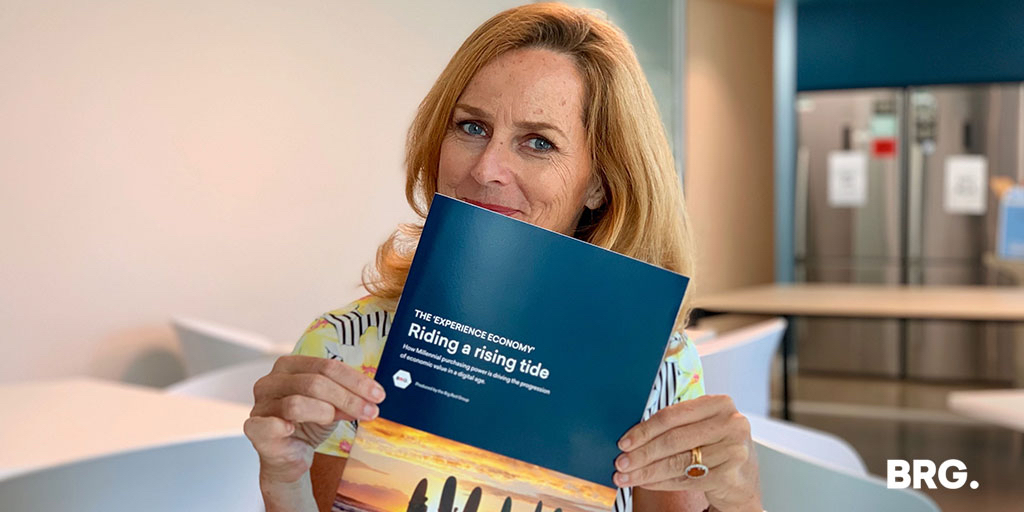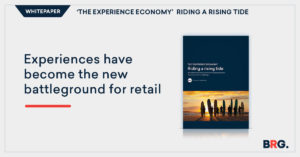This group are not just powerful spenders but they are more socially aware, more environmentally conscious and are looking for brands to buy from that reflect this – authentically. Socially conscious native brands are on the rise and businesses that understand the importance of the experience economy, for employees and customers alike, will take centre stage. This is all supported by a growing body of academic research that reveals that materialism – ie spending on physical items – is proportionally on the decline as young people believe there is a negative impact on both personal wellbeing and the planet. (Think of the rise of the Marie Kondo minimalism movement).
At the Big Red Group we have set about putting all this research about the Experience Economy in a whitepaper (to get a copy go here). What we established in theExperience Economy whitepaper is that Australian’s are even more switched on to experiences than the US counterparts – with 83 searches for experiences per capita in Australia, versus 62 in the US last year.
Young people are beginning to cohabit generationally. In simple terms this means they are not leaving home. As such the basics of food, shelter and the rest of Maslow’s hierarchy of needs are being met… so what the research shows is that discretionary money spent on experiences like travel and eating out is on the increase – and is considered to ‘boost’ happiness in a more lasting and meaningful way.
Millennials are less trusting – especially of institutions; and they watch very carefully the way that businesses ‘behave’. The brands that align with their values are authentic and consistent about the customer experience are the ones they are loyal too. (It can take up to 10 brand interactions to create this bond). Loyalty cannot be bought, it is to be earned by consistently delivering on the ‘experience’.
The sociability of these experiences is important too. Experiences help make social connections and build personal identity, and this reflects on the brands they associate with.
There is no doubt that the good life is better lived by ‘doing things’ rather than by ‘having things’. This is paramount for Millennials foremost, and also for Baby Boomers – both of which are driving the growth of the experience economy.
Millennials are emerging as the largest economic and socially aware group in history, which is perfectly timed as they join the workforce – and experiences at work are as important as the non work life.
The research has been telling us for half a decade that experiences and events is what 78 percent of Millennials choose to spend money on, over buying something material. What this means is that expenditures on experience-related services have grown nearly four times faster than expenditures on goods in only five years.
Retail is becoming all about the experience. Work is becoming all about the experience – it is infiltrating many parts of our economy. There’s an ever-increasing number of music festivals, foodie events and tastings of all sorts… many of the big brands have opened ‘experience stores’.
This passion for experiences is impacting retailers both online and offline – customer journeys are far more complicated. On average a Millennial will seek 10 pieces of information about a brand before making a purchase. Here is the Digital Customer Journey Whitepaper, and how AI is being used to manage the trillions of data points that all form part of a brand’s digital reputation.
————-
Naomi Simson entrepreneur co-founded The Big Red Group in 2017 which includes brands such as RedBalloon, Adrenaline and Redii.com. She has been blogging for a decade at NaomiSimson.com, is a professional speaker, author of Live What You Love & Ready To Soar, and a “Shark” on business reality show Shark Tank Australia. Naomi works on a number of philanthropic and educational boards. Follow:
Instagram: http://www.instagram.com/naomisimson/
Facebook: http://www.facebook.com/naomi.simson
LinkedIn: http://www.linkedin.com/in/naomisimson
Twitter: http://twitter.com/NaomiSimson
Website: http://naomisimson.com/
Also published on Medium.


